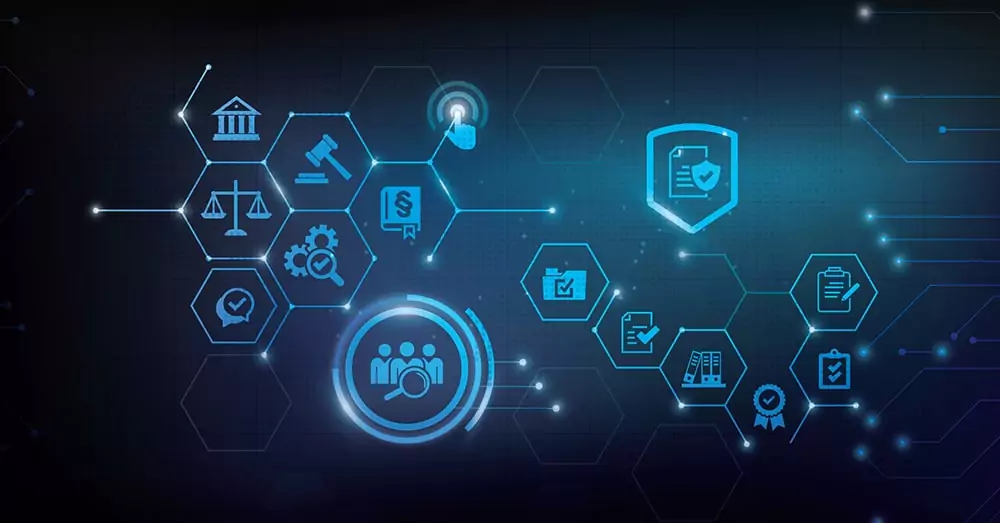In today’s data-driven enterprise, a pivotal shift is underway. As organizations build their competitive advantage through data, they’re increasingly turning to a new form of artificial intelligence that goes beyond traditional automation. This evolution—from passive AI tools to purpose-built agentic AI systems—is fundamentally changing how organizations manage, secure, and derive value from their data assets.
The Rise of Agentic AI: More Than Just Another Buzzword
While generative AI captured headlines in 2023, agentic AI represents the next frontier. Unlike traditional AI systems that simply respond to inputs, agentic AI operates with defined roles, specialized knowledge bases, and the ability to use tools to accomplish specific missions autonomously.
Think of agentic AI as digital specialists rather than generalists. Each agent is designed with:
- A clear objective and role
- Access to specific knowledge and data sources
- The ability to use tools to accomplish tasks
- Protocols for collaborating with other agents and humans
Unlike traditional AI that offers broad, generalized support, agentic AI provides focused, mission-specific capabilities with precision and adaptability.
The Data Access Revolution: Agentic AI in Action
The rapid evolution of agentic AI has transformed how organizations approach data access and utilization across multiple domains. These specialized AI systems are now performing critical data-related functions that were once the exclusive domain of human workers.
Research and Information Retrieval
OpenAI’s Deep Research Agent exemplifies the power of agentic AI in information gathering. Unlike conventional search tools, these agents don’t just return results—they actively explore multiple data sources, evaluate information quality, and compile comprehensive reports tailored to specific requirements.
For enterprise data teams, this capability transforms how insights are delivered to business stakeholders. Instead of data analysts spending hours manually searching through reports and databases, research agents can autonomously access permissioned data sources, analyze relevant information, and deliver contextualized insights in minutes rather than days.
Enterprise Automation and Data Management
UiPath’s AI Integration demonstrates how agentic AI is revolutionizing data management within enterprises. These specialized agents seamlessly integrate with existing systems to extract, transform, and analyze data across disparate platforms.
A manufacturing company implemented these agents to monitor production data across multiple facilities. The agents autonomously access quality control databases, ERP systems, and maintenance records to identify patterns that might indicate emerging production issues. This proactive approach has reduced downtime by 27% while eliminating countless hours of manual data correlation.
Marketing and Customer Engagement
Adobe’s Agent Orchestrator shows how agentic AI is transforming marketing operations. These specialized agents autonomously analyze customer data, segment audiences, and deliver personalized content based on real-time behavioral signals.
For marketing teams, these agents represent a quantum leap in data utilization. Rather than marketers manually pulling customer data reports, creating segments, and scheduling campaigns, AI agents continuously monitor customer interactions across touchpoints, instantly recognize behavioral patterns, and automatically deploy optimized messaging—all while accessing sensitive customer data that requires careful governance.
Autonomous Data Retrieval
Agentic Information Retrieval Systems built on large language models are changing how organizations leverage real-time data. These systems don’t rely solely on pre-trained knowledge—they actively access current data sources to provide contextually relevant information.
Financial institutions have deployed these agents to track market movements, access proprietary trading data, and generate immediate analysis when anomalies appear. The agents connect to multiple data feeds, including highly sensitive proprietary databases, creating both tremendous value and significant governance challenges.
Healthcare Data Management
AI Agents in Healthcare demonstrate perhaps the most sensitive application of this technology. These specialized systems autonomously manage patient data, schedule appointments, and monitor health records to identify potential care gaps or treatment opportunities.
A leading healthcare provider implemented these agents to improve chronic condition management. The agents securely access patient records, identify individuals who might benefit from preventive interventions, and automatically schedule outreach from care coordinators. While delivering impressive clinical outcomes, these agents also navigate some of the most heavily regulated data in any industry.
The Governance Conundrum: When Agents Need Access
The proliferation of AI agents accessing, analyzing, and acting upon data creates a fundamental governance challenge. Traditional data access frameworks were designed for human users with clear organizational roles, identifiable attributes, and established access patterns. AI agents operate differently:
- They may require access across traditionally siloed data sources
- They often operate continuously rather than during defined business hours
- Their access patterns can evolve as they learn and adapt
- They don’t fit neatly into existing identity and access management frameworks
This creates a complex governance question: How do organizations enable AI agents to deliver business value while maintaining appropriate control over sensitive data?
When a human employee requests access to customer data, we understand their role, their reporting structure, their training on data handling. With AI agents, those traditional governance anchors don’t exist—we need an entirely new approach.
Identity Crisis: Managing Non-Human Entities
The challenge begins with identity itself. Traditional identity and access management (IAM) systems were built around human users with employee IDs, role designations, and organizational attributes that determine appropriate access levels. AI agents don’t fit this model.
Consider some fundamental questions organizations must answer:
- Who “owns” an AI agent within the organization?
- What constitutes the agent’s “identity” for access purposes?
- How should access privileges evolve as the agent learns and adapts?
- What authentication mechanisms are appropriate for non-human entities?
- How should organizations track and audit agent activities?
Our existing identity governance was designed for employees and contractors—people with employee IDs, managers, and specific job functions. Agentic AI breaks that model entirely. We needed to rethink our fundamental approach to identity.
This identity challenge is compounded by scale. While an organization might have thousands of employees, it could potentially deploy hundreds of thousands of specialized AI agents, each requiring appropriate access controls and governance oversight.
The Agentic Solution: Fighting Fire with Fire
Ironically, the same technology creating these governance challenges also offers the solution. Forward-thinking organizations are now implementing specialized agentic AI systems designed specifically for data governance and security.
This agentic approach to data security leverages AI’s ability to continuously adapt to changing conditions:
- Discovery Agents continuously scan data repositories, automatically identifying and classifying sensitive information wherever it resides. Unlike traditional discovery tools that rely on predefined patterns, these agents understand context and can recognize sensitive data even when it appears in unexpected formats or locations.
- Policy Agents translate high-level governance requirements into granular access controls. Rather than security teams manually configuring complex permissions across multiple platforms, these specialized agents automatically implement appropriate controls based on data sensitivity, user context, and organizational policies.
- Access Control Agents analyze access requests against policy frameworks and user attributes, automatically recommending appropriate row and column-level controls. These agents understand the security capabilities of each database platform—whether it’s Snowflake’s secure views, Databricks’ Unity Catalog, or Azure SQL’s dynamic data masking—and can recommend the optimal implementation strategy for each environment. Instead of security teams manually determining which fields to mask or which rows to filter, these agents provide intelligent recommendations customized to each request’s context and risk profile.
- Monitoring Agents track how data is accessed and used across the enterprise, identifying potential risks or policy violations in real-time. These agents don’t just look for predefined violation patterns—they learn what constitutes “normal” access and can flag anomalies that might indicate security concerns.
We’ve found that using AI behavior learning to understand how data owners apply restrictions when approving access requests creates a much more dynamic and responsive security posture. The system learns from these decisions and can apply similar logic to future scenarios, reducing manual work while improving security.
Dynamic Policies for a Dynamic World
Traditional data governance relied on static policies manually implemented across systems. In a world of agentic AI, this approach simply can’t scale. The solution lies in dynamic, policy-based access control that adapts to changing contexts.
A policy-based approach focuses on the “why” of data access rather than just the “who.” Instead of granting access based solely on identity, organizations define policies that consider multiple factors:
- The sensitivity of the data being accessed
- The purpose of the access request
- The context in which access occurs
- The appropriate controls to apply (masking, anonymization, etc.)
This dynamic approach enables organizations to:
- Define governance at a higher level of abstraction, focusing on business rules rather than technical implementations
- Apply consistent controls across hybrid environments, from on-premises databases to cloud data warehouses
- Adapt automatically as data moves, transforms, or changes in sensitivity
- Maintain governance continuity even as AI capabilities evolve
The result is governance that scales with the organization’s AI ambitions rather than constraining them.
Modern Data Security Platforms: Agentic Data Security in Practice
Modern data security platforms leverage specialized AI capabilities to address the unique challenges of governing both human and AI data access.
Sentinel agents continuously monitor data access patterns across environments, identifying anomalies that might indicate security risks. Unlike traditional monitoring tools that rely on predefined rules, these agents adapt to changing patterns and recognize subtle deviations that might otherwise go unnoticed.
This approach delivers several key advantages:
- Comprehensive discovery – AI-powered classification identifies sensitive data across structured and unstructured sources, ensuring protection follows the data regardless of where it moves.
- Dynamic policy enforcement – Policies adapt to the context of each access request, applying appropriate controls based on data sensitivity, user attributes, and access purpose.
- Continuous adaptation – The system learns from data owner decisions, automatically refining policies based on observed patterns and evolving requirements.
- Cross-platform consistency – Unified policies apply consistently across on-premises databases, cloud data warehouses, and even BI tools, eliminating governance gaps.
A global financial institution implemented this approach when deploying AI agents for fraud detection. The security platform automatically discovered and classified sensitive data across multiple systems, implemented appropriate controls based on data sensitivity, and continuously monitored access patterns to identify potential risks. This enabled the organization to leverage A לאI for fraud detection while maintaining strict compliance with privacy regulations.
The Future of Agentic AI Data Governance
As organizations continue to deploy agentic AI across business functions, effective data governance will become even more critical. Forward-thinking organizations are already preparing for this future by:
- Building governance from the start – Integrating data governance requirements into the AI development process rather than treating them as after-the-fact compliance concerns.
- Creating an agent-specific track within governance frameworks – Developing governance approaches specifically designed for non-human entities, with appropriate identity models, access controls, and monitoring capabilities.
- Implementing continuous oversight – Deploying specialized monitoring agents that provide real-time visibility into how data is accessed and used across the organization.
- Developing AI ethics guidelines – Establishing clear parameters around how AI agents should handle sensitive information, potential bias in data, and edge cases where standard rules might not apply.
Conclusion: Lean into AI
As organizations increasingly rely on agentic AI to drive competitive advantage, effective agentic AI data governance becomes a strategic imperative rather than just a compliance concern. Those who build robust governance now will be positioned to leverage AI’s full potential while maintaining the security and control stakeholders demand.
The organizations that thrive won’t be those with the most advanced AI, but those who most effectively balance AI innovation with appropriate governance. In a world where data is the foundation of competitive advantage, those who master the governance challenges of agentic AI will unlock innovation possibilities others can’t safely explore.
As we enter this new era, one thing is clear: The symbiotic relationship between AI and data governance represents both a challenge and an opportunity. By embracing agentic approaches to security—using specialized AI to govern AI—organizations can transform what was once a limiting factor into a competitive advantage, enabling faster innovation with stronger protection than ever before.
Explore how Velotix’s agentic data security platform can help your organization govern AI access while accelerating innovation – schedule a demo today to see AI-powered policy automation in action.



